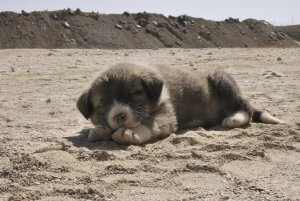Editor’s Note: This story published exclusively on Goodnewsforpets.com won an award for Ranny Green from the Dog Writers Association of America.
We’ve all had a stressful year on so many fronts from the pandemic to politics. In our attempt to brighten this special season and bring a smile to your face we’re rerunning this special feature posted earlier this year. Read if from start to finish and it will re-enforce once again why we call the dog man’s best friend.
Happy holidays to everyone from all of us at Goodnewsforpets.com.
There is an internet poster reading, “Who says your soulmate has to have two legs?”
Well, when each of you has saved the other’s life, who can dispute that aphorism? And that’s exactly what has evolved in the powerful relationship between Phil Bourrillion and a onetime war waif named Oso.
Their story is one of building a foundation of love and trust amidst the mental dynamics of challenge around every corner in the past decade.
The journey begins in Afghanistan in August 2009 and is still in play with plenty of psychological bends and breaks. Oso, a 75-pound Anatolian/Akbash Shepherd mix, is a registered Emotional Support Dog but could not be certified for therapy work because, like her owner, she suffers from PTSD (Post Traumatic Stress Disorder).
“Oso says a lot with her eyes,” says Bourrillion. “She is very empathetic and loving and recognizes when I am not OK and comes to me. We have a bond of brotherly love that might develop like two battle buddies in a war. It’s a different bond than when one simply adopts a pet from a shelter.”
But their union would not be possible without the coordinated efforts and firm commitment of Bourillion’s wife, Lena, who raised funds to bring Oso stateside while her husband was deployed in the Middle East.
At most outposts and camps in Afghanistan there is a burn pit nearby where trash is dumped. In October 2009, Bourrillion was stationed at FOB (Forward Operating Base) Sweeney (elevation 6,500 feet) in Zabul Province, a remote eastern desert region near the Pakistan border.
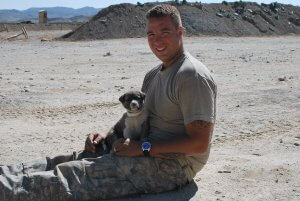
“The pit was big enough to fit a house,” Bourrillion recalls, “full of trash and constantly smoldering. While taking trash out one day I and a few others found three small pups probably a week old and no mother in sight. We each grabbed one – they fit in the palm of our hands – and snuck them back to the base.
“They obviously hadn’t eaten in a while, so we fed them scraps off of our plates, mostly ones with chicken and beef to give them protein. Initially, I was only feeding her once daily. I sent Lena pictures of the puppy, and it wasn’t long before she and others sent dog food, which took several months to arrive. By then Oso was spoiled on our rations and the dog food was used to feed other base strays.”
For Bourrillion and the two other unit members, the next two months evolved into a cat-and-mouse undercover venture hiding the puppies in cardboard boxes and beneath blankets – as U.S. military rules forbid stray dogs on the base for fear of rabies. Consequently, many dogs were shot in an attempt to quell an outbreak of the disease.
“But that wasn’t in Bourrillion’s nature. Pre-Oso, he cared for every stray creature he came across,” laughs Lena. “He earned the nickname, ‘Dr. Doolittle of Afghanistan,’ because all the animals knew he would find and save them. He rescued a huge hedgehog, named Hector, and later set him free when he was capable of foraging on his own. He had two kittens for a time, one he found just weeks old wedged in between a pallet of the 90-pound ammunition shells. He called her Shelly. She later became ill and was killed by another soldier, which left Phil devastated.”
During the day, Oso and her litter mates would roam alone while the troops were out on missions. But they didn’t want for their next meal. Their drill included snuggling together for naps near a bench outside the dining tent and as soldiers exited, they would toss scraps to them.
Oso isn’t your every-day dog’s name. It means bear in Spanish, and was given to her by an artillery buddy, Geo Amador. At the time, Bourrillion’s nickname was Bear, too. “It kinda fit,” he smiles. (Bourrillion was 6 feet 3 inches, 220 pounds at the time).
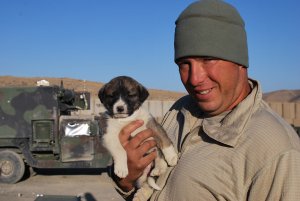
“The puppies provided an instant lift to the soldiers,” adds Lena. “Phil is a photographer/videographer and always took his equipment with him on deployments to Iraq and Afghanistan. He began e-mailing me the sweetest photos of the three pups and said he’d taken to one in particular. She was full of love, fun and joy, but she had a mischievous and cuddly side, too.
“I remember him telling me Oso gave him purpose and that he felt she was the best thing that ever happened to him during all his times at war.”
But being a rescuer can have its share of psychological hand grenades in a war zone.
At one point during the two months at Camp Sweeney with Oso and two other pups, a command officer confronted Bourrillion and ordered him to get rid of all three or shoot them. For “Dr. Doolittle” this was a gut punch, leaving him with one alternative – hide them and hope things didn’t go wrong while recognizing time wasn’t on his side.
That’s when Lena asked him about bringing Oso home to Washington state where the family was stationed. Bourrillion agreed and Lena immediately shifted gears into fast-forward networking on Facebook for leads.
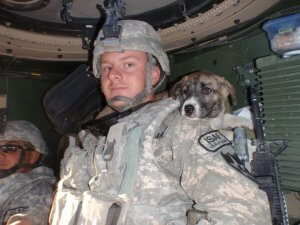
When it came time for his unit to move to a temporary base several hundred miles away, Oso was tucked away in an FMTV truck (Family of Medium Tactical Vehicles). “To stay low key, the puppy lived in the truck cab and only came out to eat and potty,” Bourrillion recalls.
Oso’s welfare and future became a long-distance push and pull of emotions with Bourrillion keeping her undercover on base while Lena was attempting to find a means of bringing her from Afghanistan to the Seattle-Tacoma area. This meant raising funds and finding a rescue organization capable of pulling off that Herculean feat.
Her Facebook efforts procured approximately $15,000, which covered the cost of transporting Oso and two other puppies – not her litter mates – stateside. Oso’s driver in Afghanistan was paid $300 to get her from the base through numerous Taliban check points — he hogtied and hid her in the back of a truck — en route to Kabul, where Nowzad Dogs (her Facebook find), a United Kingdom-based nonprofit rescue that coordinates pets’ flights out of Afghanistan is headquartered. The facility operates a clinic that provides temporary shelter for international travel.
A Safe Transport for Oso
Amidst this controlled chaos, Bourrillion was thrown a major curve ball when command bumped up his Rest & Recovery leave by several weeks and he suddenly found himself having to rely on buddies to make certain Oso was safely transported. “I thought for sure if I was going to lose her it would be then,” he says. “I was home and received a phone call from a friend in Kabul saying she had received Oso and all was good. Wow, what a relief!”
From Kabul, she was driven to Islamabad, Pakistan, days later for required rabies and other vaccinations, from where she embarked on a 50-hour flight to New York City and on to Seattle. Bourrillion’s reunion with Oso had to wait, however, since he had several more months remaining on his tour of duty. “It seemed like an eternity,” he confesses, “knowing she was home safely with Lena and I was thousands of miles away.”
It wasn’t exactly a smooth landing for Oso in Washington state, either. She was put in a 30-day rabies quarantine by the Washington State Department of Health, which did not approve the rabies vaccine administered in Pakistan. That meant placing Oso in a special isolation cabin at Pasado’s Safe Haven, an 85-acre sanctuary nestled in the foothills of the Cascade Mountains out of Seattle.
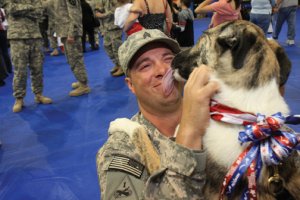
“When she finally got to our house, Oso had a lot of PTSD, anxiety and disconnect,” Lena recalls. “She didn’t interact with human touch or love nor did she have her soldier buddy there to greet her. The lengthy trip, the quarantine and now a new home which had two other dogs. I can’t imagine what must have been stirring through her mind. It took her a long time to relax, much like Phil.”
Arriving Home and Suffering From PTSD, Oso Came to the Rescue
When Bourrillion arrived home a few months later, he was a different guy, suffering from increased PTSD and physical ailments. His out-of-character behavior spilled over into heavy drinking. “Oso knew him well,” Lena says, “and intuitively stayed by his side through it all.”
July 4thfireworks and loud noises terrified both, which prompted them to retreat to a room with the TV turned loud to minimize the sounds. Bourrillion’s PTSD and drinking issues continued to skid downhill in the weeks ahead, accented with a cascading collapse of emotions.
Lena describes the scenario: “One night Phil got so drunk he was slurring his speech and trying to cuddle with Oso. She shunned him and did a low growl as a warning that she didn’t approve of his behavior and walked away from him. We both couldn’t believe it. She knew him and she wanted this unruly behavior to end. That hurt Phil’s feelings and he headed for bed crying and said his dog didn’t love him anymore. I assured him it was quite the opposite.
“I brought Oso into bed with him and she laid by his side all night while he cried and finally fell asleep petting her. She kept the other two dogs away from the bed, letting them know she was on duty and her soldier needed her.”
After a frank discussion the following day with Lena, Bourrillion reached out for help and their relationship managed to get back on track. He exited the military in 2012 with an honorable discharge and is now classified totally disabled.
Oso As An Emotional Support Partner
Since then Oso has been his traveling emotional-support partner. “She is not like other dogs who enjoy playing and fetching,” Bourrillion reflects. “She’s truly a wild dog that took almost three years to domesticate. She is very basic in her needs and loves to over-watch when she can. I talk to her like a person and she knows what I’m saying. Without me, she would be lost and confused.”
This Texas family’s emotional journey has had more bends and curves than your grocery-store pretzel. It has lived in RVs and rental units with mold, affecting the health of all. Add Bourrillion’s PTSD, depression, chronic pain, hearing loss, tinnitus and more, and daily living becomes a weighty drama.
Bourrillion has been deeply impacted by the loss of six “battle buddies” and two close friends to suicide. It came to a head in April 2019, he tearfully recalls, “I started to have my own feelings of being better off gone. I was on many meds so decided to eat a handful of them. I was sitting on the edge of my bed and had them in my hand ready to quickly swallow them when Oso walked in and gave me this look. Her eyes spoke volumes and asked, ‘What are you doing?’ I knew she had no idea what was going on or about to happen, but she must have sensed I was not my usual self.
“Normally if I get up and walk around the house she stays laying down, but this time she followed shortly behind me. She sensed something wasn’t right. I could not stand thinking what she may wonder if I was to go through with it. Feeling like she would forever be different and lost wondering where her Papa went. So I stopped. I think differently about life now. But I definitely feel if she had not been there I might not be here today.
“Maybe it was her way of silently saying thanks for saving her life a decade ago. I’ll never know, but I will forever be thankful.”
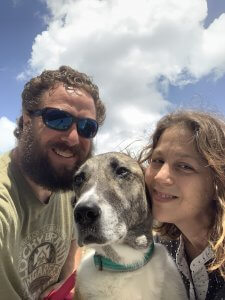
Phi, Oso and Lena spend a few gut-wrenching final hours together before the ailing dog was euthanized with lung cancer and a lung fungal infection Memorial Day weekend.
Post Script and A Call to Help Oso
Sad news: Oso died in an Austin, Texas, Memorial Day weekend of cancer and fungal infection in the lungs. The family has lived in three residences in recent years where mold has been detected.
To learn more visit this Go Fund Me Link.
Originally posted June 9, 2020.

